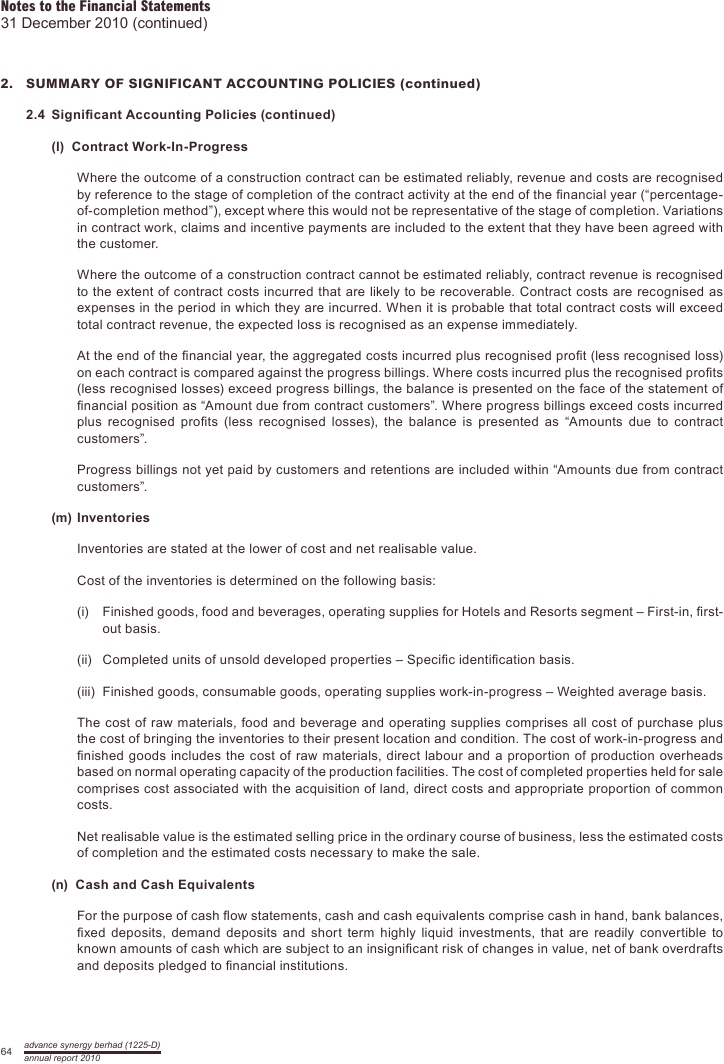Notes to the Financial Statements
31 December 2010 (continued)
2. SUMMARY OF SIGNIFICANT ACCOUNTING POLICIES (continued)
2.4 Significant Accounting Policies (continued)
(l) Contract Work-In-Progress
Where the outcome of a construction contract can be estimated reliably, revenue and costs are recognised
by reference to the stage of completion of the contract activity at the end of the financial year ("percentage-
of-completion method"), except where this would not be representative of the stage of completion. Variations
in contract work, claims and incentive payments are included to the extent that they have been agreed with
the customer.
Where the outcome of a construction contract cannot be estimated reliably, contract revenue is recognised
to the extent of contract costs incurred that are likely to be recoverable. Contract costs are recognised as
expenses in the period in which they are incurred. When it is probable that total contract costs will exceed
total contract revenue, the expected loss is recognised as an expense immediately.
At the end of the financial year, the aggregated costs incurred plus recognised profit (less recognised loss)
on each contract is compared against the progress billings. Where costs incurred plus the recognised profits
(less recognised losses) exceed progress billings, the balance is presented on the face of the statement of
financial position as "Amount due from contract customers". Where progress billings exceed costs incurred
plus recognised profits (less recognised losses), the balance is presented as "Amounts due to contract
customers".
Progress billings not yet paid by customers and retentions are included within "Amounts due from contract
customers".
(m) Inventories
Inventories are stated at the lower of cost and net realisable value.
Cost of the inventories is determined on the following basis:
(i) Finished goods, food and beverages, operating supplies for Hotels and Resorts segment First-in, first-
out basis.
(ii) Completed units of unsold developed properties Specific identification basis.
(iii) Finished goods, consumable goods, operating supplies work-in-progress Weighted average basis.
The cost of raw materials, food and beverage and operating supplies comprises all cost of purchase plus
the cost of bringing the inventories to their present location and condition. The cost of work-in-progress and
finished goods includes the cost of raw materials, direct labour and a proportion of production overheads
based on normal operating capacity of the production facilities. The cost of completed properties held for sale
comprises cost associated with the acquisition of land, direct costs and appropriate proportion of common
costs.
Net realisable value is the estimated selling price in the ordinary course of business, less the estimated costs
of completion and the estimated costs necessary to make the sale.
(n) Cash and Cash Equivalents
For the purpose of cash flow statements, cash and cash equivalents comprise cash in hand, bank balances,
fixed deposits, demand deposits and short term highly liquid investments, that are readily convertible to
known amounts of cash which are subject to an insignificant risk of changes in value, net of bank overdrafts
and deposits pledged to financial institutions.
advance synergy berhad (1225-D)
64
annual report 2010

